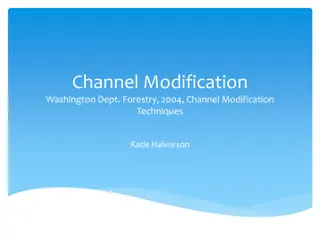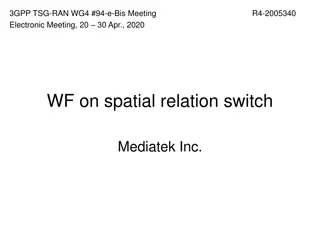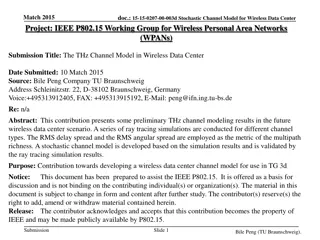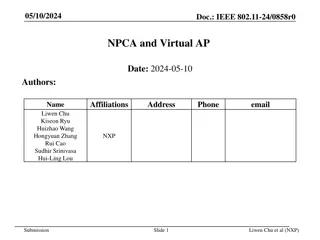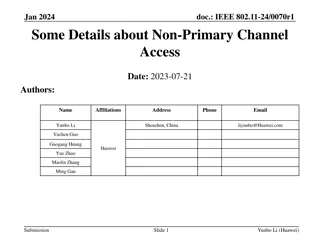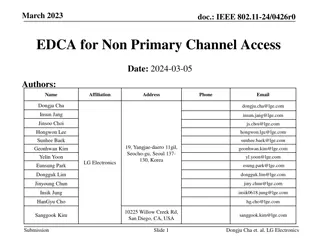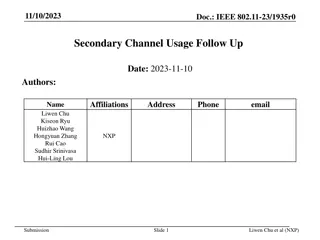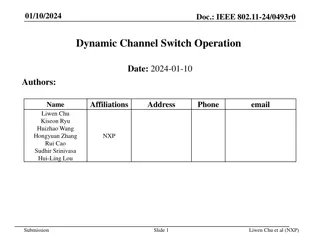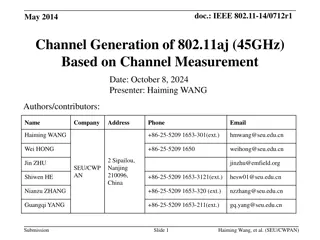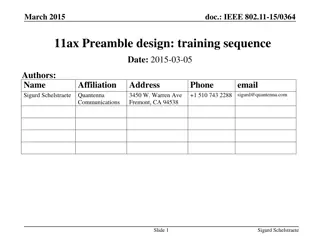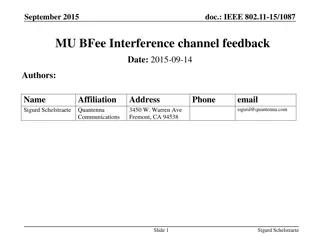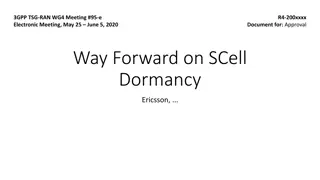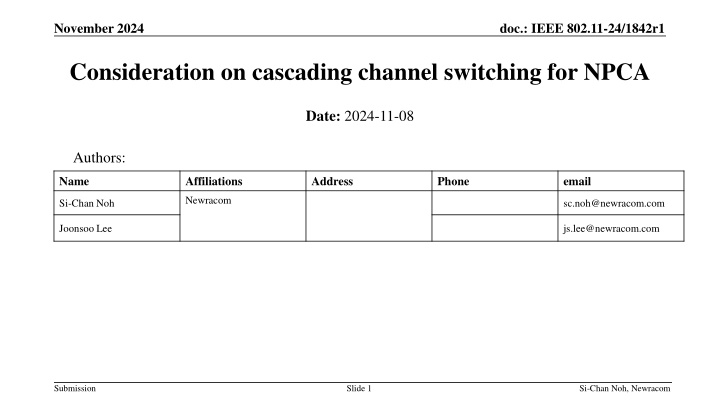
Consideration on Cascading Channel Switching for NPCA in IEEE 802.11-24/1842r1
Explore the considerations for Non-Primary Channel Access (NPCA) in IEEE 802.11-24/1842r1, focusing on channel switch triggering conditions and the impacts of NPCA operations on spectral utilization and network throughput. Delve into the complexities of channel switching for NPCA-supporting STAs and the need for optimizing NPCA performance amidst cascading channel switching behaviors to enhance network efficiency.
Download Presentation

Please find below an Image/Link to download the presentation.
The content on the website is provided AS IS for your information and personal use only. It may not be sold, licensed, or shared on other websites without obtaining consent from the author. If you encounter any issues during the download, it is possible that the publisher has removed the file from their server.
You are allowed to download the files provided on this website for personal or commercial use, subject to the condition that they are used lawfully. All files are the property of their respective owners.
The content on the website is provided AS IS for your information and personal use only. It may not be sold, licensed, or shared on other websites without obtaining consent from the author.
E N D
Presentation Transcript
November 2024 doc.: IEEE 802.11-24/1842r1 Consideration on cascading channel switching for NPCA Date: 2024-11-08 Authors: Name Affiliations Address Phone email Newracom Si-Chan Noh sc.noh@newracom.com Joonsoo Lee js.lee@newracom.com Submission Slide 1 Si-Chan Noh, Newracom
November 2024 doc.: IEEE 802.11-24/1842r1 Abstract This document discusses the NPCA channel switch triggering conditions for NPCA-supporting STAs from another perspective (i.e., not about the PPDU format, not based on TXOP/PPDU/Service Period(SP), etc) when the primary channel is occupied due to a transmission caused by the NPCA operation of OBSS Submission Slide 2 Si-Chan Noh, Newracom
November 2024 doc.: IEEE 802.11-24/1842r1 Motivation Non-Primary Channel Access (NPCA) channel switch trigger conditions have been discussed in TGbn [1-4] TXOP/PPDU/Service Period based NPCA Control frame exchange/Pre-HE and HE+ format TXOP/PPDU duration constraint to prevent inefficient NPCA If OBSS s transmissions that meet the above conditions occupy the MyBSS primary channel and these transmissions are caused by NPCA operations, should NPCA STAs perform channel switching? It may be needed to consider whether NPCA operation should be performed for all OBSS frames detected on the primary channel Submission Slide 3 Si-Chan Noh, Newracom
November 2024 doc.: IEEE 802.11-24/1842r1 Channel switching for NPCA The NPCA operation may increase spectral utilization of the unused secondary channel when the primary channel is occupied However, it might be necessary to consider the advantages of NPCA when the BSS primary channel is occupied due to a transmission generated by NPCA operations between OBSS s NPCA STAs When NPCA STAs are allowed to switch to the NPCA primary channel regardless of whether the OBSS frame is generated by NPCA operations, frequent channel switching may occur It can reduce power efficiency and degrade overall performance of the BSS Moreover, if a PPDU generated by OBSS NPCA STAs occupy the MyBSS primary channel, it can cause MyBSS NPCA STAs to switch to its NPCA primary channel(Ch1); this may also trigger another OBSS NPCA STAs, which use the aforementioned NPCA primary channel(Ch1) as their primary channel, to switch to their designated NPCA primary channel(Ch2) It can lead to cascading channel switching behavior, which may impact the entire network throughput Submission Slide 4 Si-Chan Noh, Newracom
November 2024 doc.: IEEE 802.11-24/1842r1 Cascading channel switching for NPCA If the NPCA channel switching conditions can be triggered by NPCA operation of an OBSS, we can consider it from two scenarios S1) When OBSS NPCA STAs switch to MyBSS primary channel The number of backoff contenders on the MyBSS primary channel could be increased OBSS NPCA STAs have an advantage, but we could consider the trade-off where this advantaged leads to disadvantage to MyBSS STAs If MyBSS STAs cannot access the channel, allowing MyBSS NPCA STAs to perform NPCA might be an efficient way However, there may be situations where waiting until the end of the frame exchange between OBSS s NPCA STAs (i.e., at the time when switching back to their primary channel) on the MyBSS primary channel is more beneficial at some points than performing NPCA This is because we cannot ensure the NPCA primary channel for MyBSS NPCA STAs will be IDLE; In addition, since congestion due to OBSS NPCA STAs can be merely temporary, having MyBSS NPCA STAs switch channels while consuming power could reduce power effieciency S2) When MyBSS NPCA STAs switch channel due to NPCA operation of an OBSS In terms of OBSS that using the MyBSS NPCA primary channel as its BSS primary channel, this could increase the number of backoff contenders and potentially trigger NPCA operation in that OBSS It can bring P1) recursively Submission Slide 5 Si-Chan Noh, Newracom
November 2024 doc.: IEEE 802.11-24/1842r1 Example of cascading channel switching Description : The NPCA available channels of BSS1/BSS2 overlap with the primary channels of BSS2/BSS3, respectively Freq. Scenario : BSS1 NPCA STAs switch channel to its NPCA primary channel BSS1 NPCA STAs contend with BSS2 STAs, and with the channel contention BSS2 NPCA STAs switch channel to its NPCA primary channel BSS2 NPCA STAs contend with BSS3 STAs, and with the channel contention BSS3 NPCA STAs switch channel to its NPCA primary channel BSS3 NPCA STAs contend with BSS_X STAs and with the channel contention BSS3 NPCA BSS2 NPCA available channel ( BSS3 primary channel) BSS3 NPCA STAs switch back BSS3 NPCA STAs switch BSS2 NPCA BSS2 NPCA STAs switch back BSS2 NPCA STAs switch BSS1 NPCA available channel ( BSS2 primary channel) BSS2 BSS3 BSS1 BSS1 NPCA BSS1 NPCA STAs switch back BSS1 NPCA STAs switch AP1 AP2 AP3 OBSS TXOP Submission Slide 6 Si-Chan Noh, Newracom
November 2024 doc.: IEEE 802.11-24/1842r1 Prevent cascading channel switching Since the NPCA primary channel during the NPCA operation can cause cascading channel switching of OBSS NPCA STAs, we consider methods to limit cascading channel switching Proposal 1: Including an explicit indication in the PPDU to notify that this PPDU is generated from the NPCA operation If the NPCA STA initiates frame exchange on the NPCA primary channel with an ICF, it may include an indication within the ICF to prevent NPCA operation of OBSS; and/or Indicate the NPCA mark within the UHR SIG field when transmitting UHR PPDU format When NPCA STAs overhear the NPCA indication on the primary channel, they may optionally choose whether to perform NPCA or not as follows : Opt 1) Do not perform NPCA until the OBSS NPCA STAs switch back to their primary channel Opt 2) Switching to NPCA primary channel to perform NPCA; After that, do not use untriggered transmission, considering the trade-off between the benefits of NPCA and the increase in backoff contenders due to NPCA Allow only the NPCA AP to attempt channel contention Submission Slide 7 Si-Chan Noh, Newracom
November 2024 doc.: IEEE 802.11-24/1842r1 Summary In this presentation, we discuss some approaches for NPCA STAs to mitigate the excessive NPCA which can cause cascading channel switching Including an explicit indication in the PPDU ICF when NPCA STAs initiate frame exchange on the NPCA primary channel; and/or Transmission of UHR PPDU format between NPCA STAs on the NPCA available channel Create an OBSS AP list that aligns with MyBSS primary channel Submission Slide 8 Si-Chan Noh, Newracom
November 2024 doc.: IEEE 802.11-24/1842r1 Reference [1] 24/0495r0, Non-Primary Channel Access (NPCA) - Follow up [2] 24/0496r1, Secondary Channel Usage Follow Up [3] 24/1115r1, Channel Switching Rules for NPCA [4] 24/1259r0, SP-based non-primary channel access follow-up Submission Slide 9 Si-Chan Noh, Newracom
November 2024 doc.: IEEE 802.11-24/1842r1 SP1 Do you agree to include an explicit indication in the PPDU(TBD) on the NPCA primary channel during NPCA operation? The details are TBD Submission Slide 10 Si-Chan Noh, Newracom




